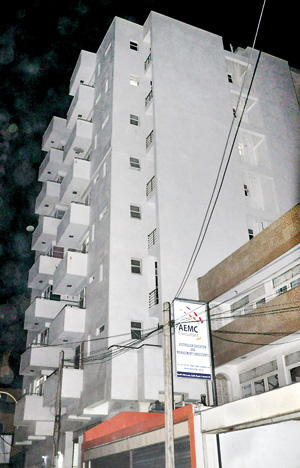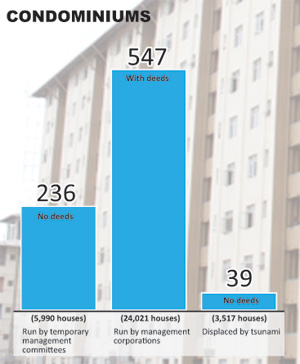News
Deeds and misdeeds: 6,000 owners fall flat in condominiums
Owners of flats in a shocking 236 condominiums —a majority of them in Colombo — do not hold deeds to their properties, statistics show. These buildings contain nearly 6,000 housing units and have not been certified by the Condominium Management Authority for various reasons. As a result, their developers are prevented from lodging the Deeds of Declaration with the Land Registry, a procedre that would allow them to transfer ownership of the flats to respective buyers.

The Good Hope Apartment Complex where the residents say they have no deeds of ownership for the flats they have bought and are living in. Pic by Nilan Maligaspe
One of the main reasons why condominiums are not certified by the CMA is that local authorities have declined to issue certificates of conformity (COC) upon completion. This document offers proof that the buildings meet minimum regulatory, technical and safety requirements. CMA officials said many of the affected developers had deviated from approved construction plans midway. This precluded them from obtaining COCs, a mandatory requirement for CMA approval.
Among those without deeds are possessors of flats in a large number of condominiums built by the State, CMA records show. Additionally, there are 39 blocks — comprising 3,517 housing units — constructed by NGOs for families displaced by the 2004 tsunami that still require CMA certification. At present, only 547 condominiums containing 24,021 housing units are CMA-certified, with deeds correctly issued to owners.
Many investors in condominiums built by private developers in the early 2000s have been affected. One such homeowner is K. Ariyasena, a resident of Britain. In 2004, she and her husband were told of a man named Joseph Gunapalan Thiagarajah who proposed to put up an apartment block in Sri Lanka.
The couple met him in West London and reserved a flat in the proposed condominium at Sagara Road in Bambalapitiya. Over the next few years, they paid the developer around Rs. 10 million in instalments. They moved into the furnished house in 2007.
All the flats were snapped up but nobody received deeds. “We were told we would get them within three months,” Ms. Ariyasena recalled. “We asked many times. He gave various excuses. He said he was not a crook and that he will give the deeds. He claimed he was doing everything necessary. Now he doesn’t even answer my calls.”
Ms. Ariyasena learned that investors in two other properties developed by Mr. Thiagarajah had similar issues. One was at Beach Road in Mt. Lavinia; another at 19th Lane in Kollupitiya. The condominium she occupied, called Good Hope Apartments, had no COC. This was primarily because a penthouse had been constructed in contravention of the approved plan. But there were also other problems. During a storm, the roof of the penthouse crashed into the garden of an adjoining house, leading to a dispute with the neighbour. Now a widow in her late sixties, Ms. Ariyasena is desperate to have her deed. She would like to pass on the property to her children. She went to the Colombo Municipal Council, which is the relevant local authority, and the CMA for a solution. They have offered her nothing.
 “The Condominium Authority told me I would have to wait and that the developer would give me the deed,” she said, desolately. “Nobody says anything definite. This is a real problem to me.” Several other owners of flats in Good Hope Apartments are advanced in age. They can neither bequeath their property to their descendants nor sell it to anyone. Mr. Thiagarajah has told the authorities he is after a kidney transplant and needs some time to recuperate.
“The Condominium Authority told me I would have to wait and that the developer would give me the deed,” she said, desolately. “Nobody says anything definite. This is a real problem to me.” Several other owners of flats in Good Hope Apartments are advanced in age. They can neither bequeath their property to their descendants nor sell it to anyone. Mr. Thiagarajah has told the authorities he is after a kidney transplant and needs some time to recuperate.
The Sunday Times questioned CMA officials about the case. “I have the details here,” said J.D.N Chandrapala Dissanayake, Deputy General Manager (Regulatory), pointing to a file. “I spoke to the developer. He said he had suffered kidney failure and was recovering from an operation. He wanted one month. In 2014, he submitted an amended plan to the local authority. We said we will help him. We will work on this.”
The CMA has multiple complaints related to absent deeds. Since 2012, ten court cases have been filed against developers over “non-registration of condominium plans”. One was resolved. In another, the respondent undertook to obtain the COC before the next inquiry date. The rest are pending. Some of the developers are large companies with multiple properties.
Occupants of condominiums could appeal to the CMA by way of a letter signed jointly by all of them. This allows officials to initiate an inquiry, even take legal action. The Authority often receives complex complaints. Some investors have advanced money to developers, only to have construction stopped at various stages. Other developers have mortgaged the land on which the condominium is being built, automatically transferring the responsibility of issuing deeds to the bank or finance company.
“In another case, the developer has died,” said Nisansala Illayaperuma, Assistant General Manager (Legal). “He is divorced from his wife and has no children. The CMA certificate is ready but there is nobody to sign on behalf of the developer so those who bought the flats are without deeds.” It is now likely that a testamentary case will be filed to determine if there are any heirs.
Since the CMA was set up in 2003 —around the time condominiums started mushrooming in Colombo —not a single regulation has been promulgated. Officials say these are finally being drawn up. Another amendment has been drafted to temporarily allow the CMA to issue certificates, on fulfillment of certain conditions, to several condominiums that need them. Some developers are in line for heavy fines.
Starting this year, all proposed constructions must be cleared beforehand by the CMA, said General Manager K.H.A. Upali. “We want to regularise everything,” he said. New condominiums will have to include elements such as a ground floor toilet, a room for drivers to rest and a meeting area. Parking requirements will be strictly enforced.
Despite all this, there are complaints that the CMA is not active in pursuing its mandate. “Everybody is dissatisfied with it,” said a property lawyer who did not wish to be named. “They do not understand our problems and they operate in their airtight compartments. It does not help clients.”
“They make it so difficult for people,” he continued. “They have to go so many times to get something done. The CMA has also caused problems by giving wrong determinations and decisions. And does it take so long to draft regulations? The last amendment was in 2003. It is now 2015!”
Ajithaa Edirimane, another property law practitioner, has been pushing for amendments to the Apartment Ownership Law. “There have been vast changes taking place within the past few years,” she said. “The US and other developed countries are constantly updating their laws to reflect this.”
The Law Commission set up a subcommittee to propose amendments with Ms. Edirimane as one of its members. Four meetings were held before the Government changed and the Commission was reconstituted. There have been no moves to convene any more sittings on the matter.

